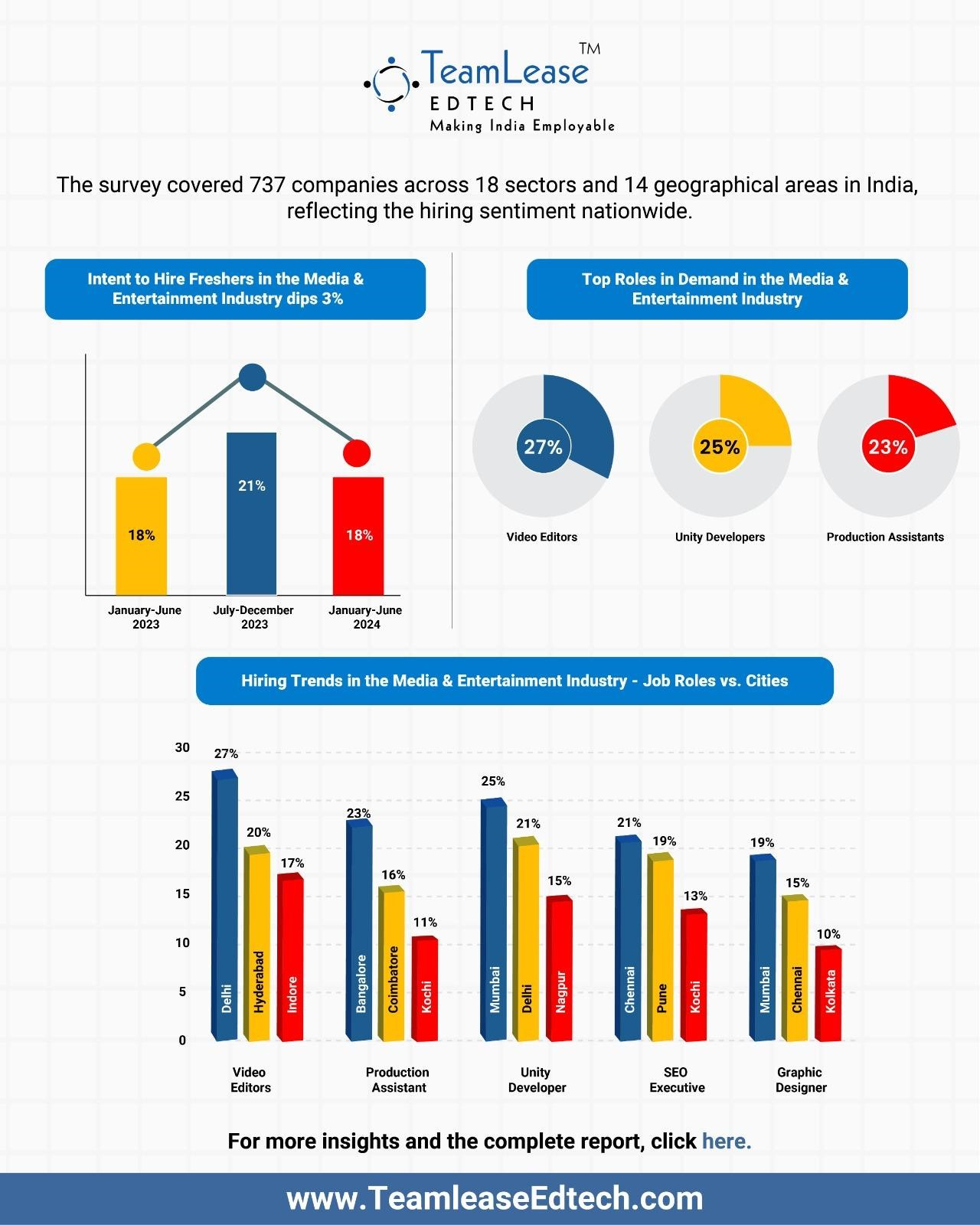In the ever-evolving media and entertainment industry, hiring trends are crucial in shaping career opportunities for freshers. A recent report by TeamLease EdTech sheds light on a notable development: a 3% decrease in the intent to hire freshers in the media and entertainment sector during January- June 2024. While there was a 6% year-on-year increase in the overall intent to hire freshers, the report indicates a decrease in the hiring outlook specifically for the media sector.
Key insights:
- The intent to hire freshers in the Media & Entertainment industry is recorded at 18% for January-June 2024, down from 21% in the previous half-year (July-December 2023).
- This percentage remains unchanged from the January-June 2023 period, signaling a pause in fresher hiring momentum within the sector.
- Roles such as Video Editor, Production Assistant, Unity Developer, SEO Executive, and Graphic Designer are experiencing high demand, necessitating skills in video creation, editing, game development, and digital marketing.
- Delhi leads in demand for Video Editors at 27%, while Mumbai takes the top spot for Unity Developers at 25%.

In this blog we will delve deeper into the causes that drive this trend and its implications for aspiring professionals.
Understanding the Decline
As per the Career Outlook Report Jan-June, 2024, the intent to hire is undoubtedly decreasing, which leads one to speculate about the internal factors in the media and entertainment sector. The effect of tech advancement on the industry will also be looked into. The digital transformation in content creation, distribution, and consumption is altering the nature of companies' employment, and in response, they're likely adjusting their workforce requirements to fit the current trend. Jobs involving digital skills, including developing content for websites, analyzing information for customer insights, and digital marketing, may become more in-demand jobs than usual.
Industry Evolution and Skill Demand
The media and entertainment sector's evolution extends beyond technology. Changing audience preferences, content formats, and business models also influence hiring patterns. For instance, the rise of streaming services has created a demand for professionals skilled in content curation, platform management, and user experience optimization. Similarly, the growing focus on diversity, inclusion, and sustainability in media content has led to the emergence of roles focused on these areas.
Navigating the Job Market
For the ones who are newbies in the media and entertainment industry, it becomes one of their biggest challenges to manage the crisis of the job market that is constantly transforming, and you need to be quite observant and effective. However, some positions will witness a reduction in demand while new job opportunities hitherto unknown will appear. The ability to come up with creative ideas and technological prowess are highly advantageous in the current workforce. The capability to edit videos, manage social media, optimize SEO and use data analytics are the employment characteristics that will make a fresh school leaver competitive across the media and entertainment industries.
Education and Training are the Elements of a Successful Workforce
Education sectors, including institutions and training providers, have also evolved into something that can be aligned with the shifting hiring practices. Business and professional organizations, colleges and universities that are up to date with market requirements, and practical education programs. Freshers could exploit this important channel to develop their very sought-after abilities, thus placing them in leading positions in the job market.
Future Outlook and Adaptation
Though the mention of the fall in the intent to hire freshers in the media and entertainment sector is a significant point, it is essential to understand the particularities and see it in the context of the industry. The need will always be there because social media, content forms, and the audience's connectivity are moving so fast. Accommodating these changes, regularly upskilling, and having an agile approach to career options are critical strategies for younger people who aim to find their feet in the globalized media and entertainment industry.
In conclusion, examining changes in employment paradigms enables employers to understand employment patterns and gives freshers the authority to understand their place in the job market. By understanding the forces driving these changes and proactively aligning skills and strategies, individuals can navigate the evolving landscape of media and entertainment recruitment with confidence and resilience.
